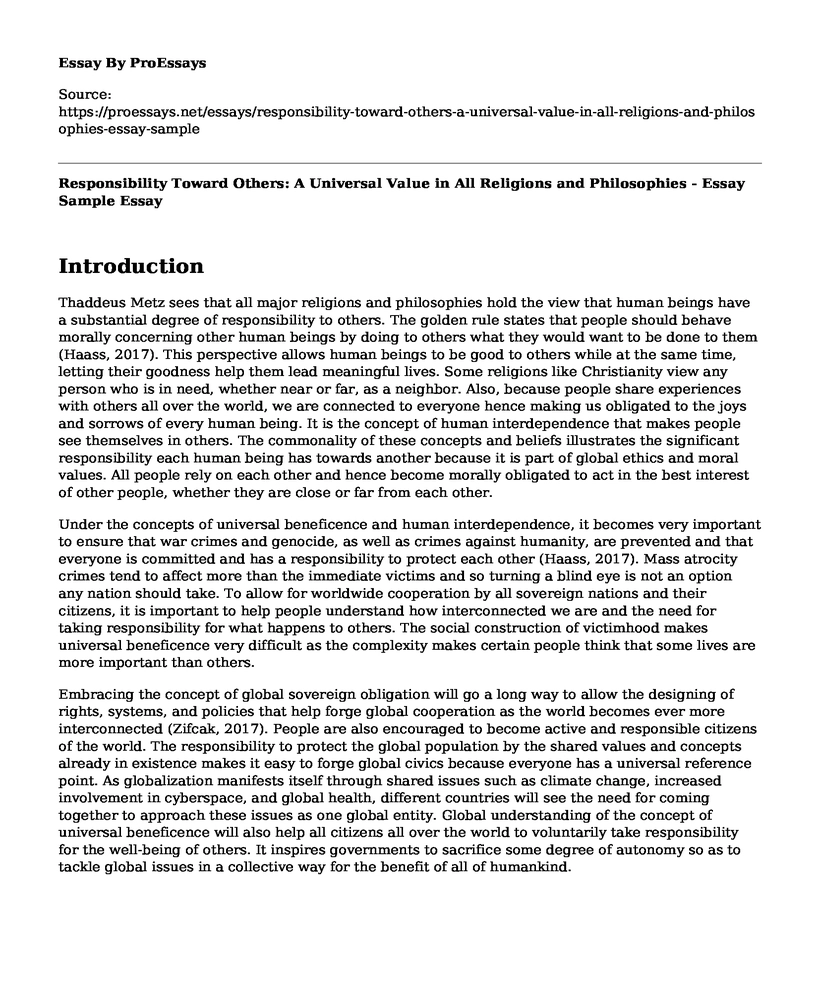Introduction
Thaddeus Metz sees that all major religions and philosophies hold the view that human beings have a substantial degree of responsibility to others. The golden rule states that people should behave morally concerning other human beings by doing to others what they would want to be done to them (Haass, 2017). This perspective allows human beings to be good to others while at the same time, letting their goodness help them lead meaningful lives. Some religions like Christianity view any person who is in need, whether near or far, as a neighbor. Also, because people share experiences with others all over the world, we are connected to everyone hence making us obligated to the joys and sorrows of every human being. It is the concept of human interdependence that makes people see themselves in others. The commonality of these concepts and beliefs illustrates the significant responsibility each human being has towards another because it is part of global ethics and moral values. All people rely on each other and hence become morally obligated to act in the best interest of other people, whether they are close or far from each other.
Under the concepts of universal beneficence and human interdependence, it becomes very important to ensure that war crimes and genocide, as well as crimes against humanity, are prevented and that everyone is committed and has a responsibility to protect each other (Haass, 2017). Mass atrocity crimes tend to affect more than the immediate victims and so turning a blind eye is not an option any nation should take. To allow for worldwide cooperation by all sovereign nations and their citizens, it is important to help people understand how interconnected we are and the need for taking responsibility for what happens to others. The social construction of victimhood makes universal beneficence very difficult as the complexity makes certain people think that some lives are more important than others.
Embracing the concept of global sovereign obligation will go a long way to allow the designing of rights, systems, and policies that help forge global cooperation as the world becomes ever more interconnected (Zifcak, 2017). People are also encouraged to become active and responsible citizens of the world. The responsibility to protect the global population by the shared values and concepts already in existence makes it easy to forge global civics because everyone has a universal reference point. As globalization manifests itself through shared issues such as climate change, increased involvement in cyberspace, and global health, different countries will see the need for coming together to approach these issues as one global entity. Global understanding of the concept of universal beneficence will also help all citizens all over the world to voluntarily take responsibility for the well-being of others. It inspires governments to sacrifice some degree of autonomy so as to tackle global issues in a collective way for the benefit of all of humankind.
Conclusion
All the major religions and philosophies share some prevailing ideologies relating to the responsibilities that human beings have towards each other and the moral obligations that make everyone interdependent on one another. It is for this reason that the world should come together and work as a single entity to solve the issues that affect everyone globally. It is the reason why the concept of global sovereign obligation is very important.
References
Haass, R. (2017). World order 2.0: The case for the sovereign obligation. Foreign Aff., 96, 2.
http://globaltrust.tau.ac.il/richard-n-haass-the-case-for-sovereign-obligation/https://www.youtube.com/watch?v=k1IlC46REjohttps://www.youtube.com/watch?v=oRiDsIbGojU
Zifcak, S. (2017). The responsibility to protect. In The Use of Force in International Law (pp. 571-595). Routledge.
Cite this page
Responsibility Toward Others: A Universal Value in All Religions and Philosophies - Essay Sample. (2023, Aug 03). Retrieved from https://proessays.net/essays/responsibility-toward-others-a-universal-value-in-all-religions-and-philosophies-essay-sample
If you are the original author of this essay and no longer wish to have it published on the ProEssays website, please click below to request its removal:
- Research on Identity
- A Letter to Bartolome de las Casas in Response to His Book
- Why Kant's Theory was Revolutionary? - Essay Sample
- Comparison Between Plato's Allegory to The Truman Show
- Essay Example on Glaucon's Argument Against Socrates on Justice in Plato's Republic
- Bible's Financial Wisdom: Taking Charge of Your Finances - Essay Sample
- The Impact of Religious Convictions on the HIV Pandemic - Report Example







